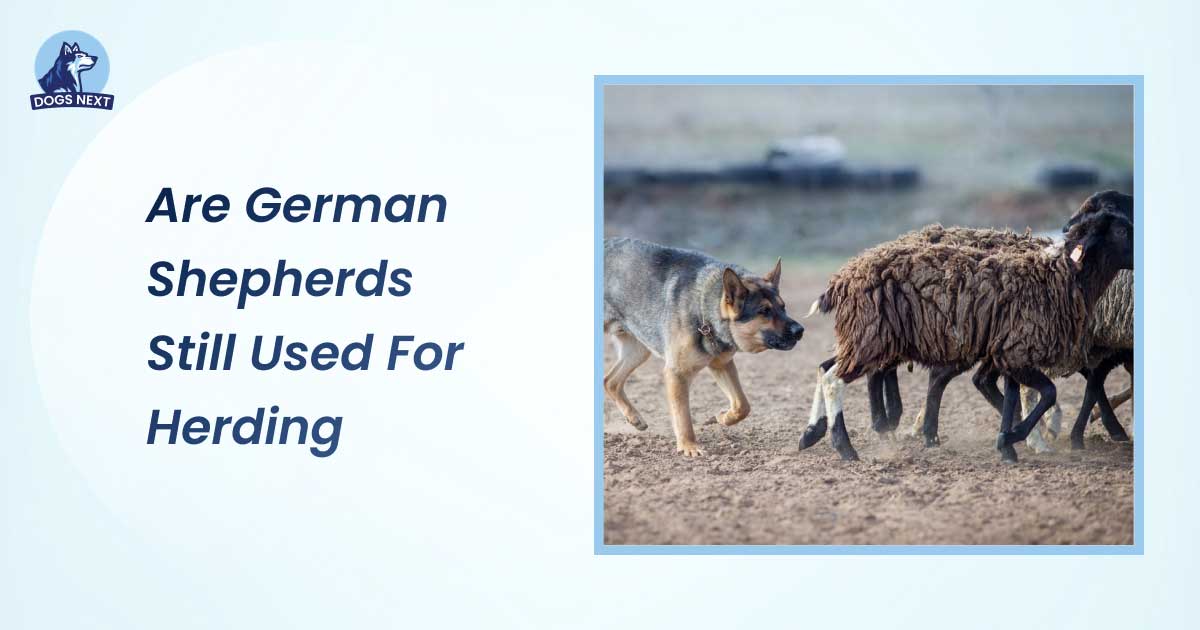Yes, German Shepherds are still used for herding. Their intelligence and agility make them ideal for this task.
German Shepherds originated in Germany in the late 19th century as herding dogs. Known for their intelligence, strength, and versatility, they excel in various roles beyond herding. Modern German Shepherds continue to thrive in herding environments, showcasing their natural instincts and abilities.
These dogs are not only loyal and hardworking but also highly trainable. Their strong work ethic and keen sense of duty make them invaluable in agricultural settings. While they are renowned for roles in police and military work, their herding roots remain significant. German Shepherds maintain their status as exceptional herding dogs, capable of handling livestock with precision and care.
The Origins Of The German Shepherd As A Herding Dog
Are German Shepherds still used for herding? This question leads us back to the origins of the German Shepherd as a herding dog. Understanding the roots of this breed helps us appreciate their continued relevance in herding tasks today.
Breed’s Early History
The German Shepherd history begins in the late 19th century. Captain Max von Stephanitz, a German cavalry officer, desired a versatile working dog. He aimed to create a breed that excelled in various tasks, particularly herding. In 1899, he found his ideal dog at a dog show and named him Horand von Grafrath. This dog became the first registered German Shepherd.
The breed quickly gained popularity. German Shepherds were known for their strength, intelligence, and versatility. By 1901, the first breed standard was established, highlighting the dog’s herding abilities. Breeders focused on maintaining these traits, ensuring the breed’s suitability for herding and other roles.
Here’s a quick overview of the breed’s early history:
- Late 19th century: Captain Max von Stephanitz seeks a versatile working dog.
- 1899: Horand von Grafrath becomes the first registered German Shepherd.
- 1901: First breed standard established, emphasizing herding skills.
Purpose In Herding
The primary purpose in herding for German Shepherds was to manage large flocks of sheep. Their role involved not just guiding the sheep, but also protecting them from predators. German Shepherds excelled in this role due to their agility, strength, and keen instincts.
These dogs were bred to work independently, making quick decisions to keep the flock together. They displayed a natural ability to anticipate the sheep’s movements and react accordingly. This independent decision-making was crucial for efficient herding.
Key aspects of their herding purpose included:
- Guiding: Leading the flock to desired locations.
- Protecting: Guarding against predators like wolves.
- Decision-making: Acting independently to manage the flock.
Livestock Management
In livestock management, German Shepherds proved invaluable. They were used to control and direct the movements of livestock, ensuring they stayed within designated areas. Their herding capabilities extended beyond sheep to cattle and other livestock.
Their agility allowed them to navigate various terrains, from open fields to dense forests. This adaptability made them perfect for diverse herding environments. German Shepherds also demonstrated a strong work ethic, often working long hours without tiring.
A table showing their livestock management skills:
| Skill | Description |
| Control | Directing livestock movements. |
| Adaptability | Working in various terrains. |
| Stamina | Working long hours without fatigue. |
Breed’s Intelligence And Trainability Made For Herding Tasks
The breed’s intelligence and trainability were key factors in their herding success. German Shepherds are known for their quick learning abilities. They can be trained to perform complex tasks, making them ideal for herding.
These dogs possess a high level of obedience. They respond well to commands, ensuring they execute tasks efficiently. Their intelligence also allows them to learn from experiences, improving their herding skills over time.
Some highlights of their intelligence and trainability:
- Quick learning: Ability to grasp tasks rapidly.
- Obedience: High responsiveness to commands.
- Experience-based learning: Improving skills through practice.
The German Shepherd’s versatility extends beyond herding. They are used in various roles, such as police work, search and rescue, and service dogs. Their intelligence and trainability make them suitable for these diverse tasks.
Modern Uses Of German Shepherds In Herding
German Shepherds are famous for their intelligence, strength, and versatility. Originally bred for herding sheep in Germany, they have evolved into one of the most popular breeds for various roles. But are German Shepherds still used for herding today? Let’s explore the modern uses of German Shepherds in herding.
German Shepherds continue to play significant roles in herding and livestock management. Their intelligence and trainability make them ideal for various tasks beyond traditional herding.
- Livestock Management Dogs: German Shepherds help manage and protect livestock, ensuring they stay together and guiding them to designated areas.
- Guardians: They act as protectors against predators, safeguarding sheep, goats, and other livestock.
- Versatile Workers: Apart from herding, they assist in farm tasks, showcasing their adaptability and multifunctional skills.
German Shepherd herding today involves advanced training programs. These programs teach them complex commands and scenarios, enhancing their efficiency. They are often seen in farms where precision and quick decision-making are crucial. Their ability to work long hours without tiring ensures they remain valuable assets in modern herding.
Comparison With Other Herding Breeds
German Shepherds are among the top herding breeds, but how do they compare to other breeds?
| Breed | Strengths | Weaknesses |
| German Shepherd | Intelligent, versatile, strong | Requires extensive training |
| Border Collie | Highly energetic, very intelligent | Needs constant activity |
| Australian Shepherd | Versatile, good with livestock | Prone to health issues |
German Shepherds excel in versatility and strength. They can manage multiple roles, unlike some breeds that specialize in specific tasks. While Border Collies are known for their intelligence and energy, they may not be as strong or versatile as German Shepherds. Australian Shepherds are good all-rounders but often face health challenges.
Modern herding dogs need to adapt to various tasks. German Shepherds stand out due to their ability to perform multiple roles efficiently. Their strong work ethic and loyalty make them preferred choices for many farmers.
Why German Shepherds Are Less Common In Herding Now
German Shepherds are famous for their intelligence and versatility. Many people wonder if they are still used for herding. Over time, there has been a shift. Let’s explore why German Shepherds are less common in herding now.
The Rise Of Other Specialized Herding Breeds
German Shepherds were once top choices for herding. Today, more specialized herding dogs are preferred. Here are some reasons:
- Specific Skills: Breeds like Border Collies and Australian Shepherds excel in herding. They have natural instincts and agility.
- Energy Levels: Specialized herding dogs have higher energy levels. They can work longer hours in the field.
- Speed and Agility: These breeds are faster and more agile. They can handle quick-moving livestock better.
Let’s compare some popular herding breeds:
| Breed | Herding Skills | Energy Level |
| Border Collie | Excellent | Very High |
| Australian Shepherd | Very Good | High |
| German Shepherd | Good | Medium |
The decline in herding breeds like the German Shepherd is due to the rise of these specialized herding dogs. They are bred specifically for herding tasks and are more efficient.
Commonly Used In Police, Military, And Service Work
Another reason for the changing roles of German Shepherds is their use in other fields:
- Police Work: German Shepherds are excellent in police work. They are strong, smart, and loyal.
- Military Work: They serve in the military. Their intelligence and strength make them ideal.
- Service Work: German Shepherds help as service dogs. They assist people with disabilities.
Let’s see the German Shepherd work alternatives:
| Field | Role | Why German Shepherds? |
| Police | Detection, Search and Rescue | Intelligence, Loyalty |
| Military | Patrol, Detection | Strength, Obedience |
| Service | Guide Dogs, Therapy | Trainability, Calm Nature |
These German Shepherd work alternatives showcase their versatility. This shift to police, military, and service work explains their decline in herding breeds roles. Their skills are invaluable in these fields.
Frequently Asked Questions
Are German Shepherds Still Used For Herding?
Yes, German Shepherds are still used for herding. They are versatile, intelligent, and have strong herding instincts. Many farms continue to use them for livestock management.
What Makes German Shepherds Good Herding Dogs?
German Shepherds are good herding dogs due to their intelligence and agility. Their strong work ethic and trainability make them excellent for herding tasks.
Do German Shepherds Excel In Herding Competitions?
Yes, German Shepherds excel in herding competitions. Their intelligence and agility help them perform various herding tasks effectively. They often win awards.
How Do You Train A German Shepherd For Herding?
Training a German Shepherd for herding involves basic obedience training first. Then, introduce them to livestock gradually. Consistent practice and positive reinforcement are key.
Conclusion
German Shepherds continue to excel in herding roles. Their intelligence and agility make them ideal for these tasks. Farmers still rely on their skills to manage livestock effectively. This breed’s versatility ensures they remain valuable in herding and various other roles.
German Shepherds’ legacy in herding endures, proving their timeless utility.

I’m David, an expert contributor and writer, with two furry friends of my own, I know the challenges of raising and caring for dogs. From training to nutrition and health, my goal is to provide valuable insights and advice to help create strong bonds and happy, healthy lives. Find me in Twitter.




